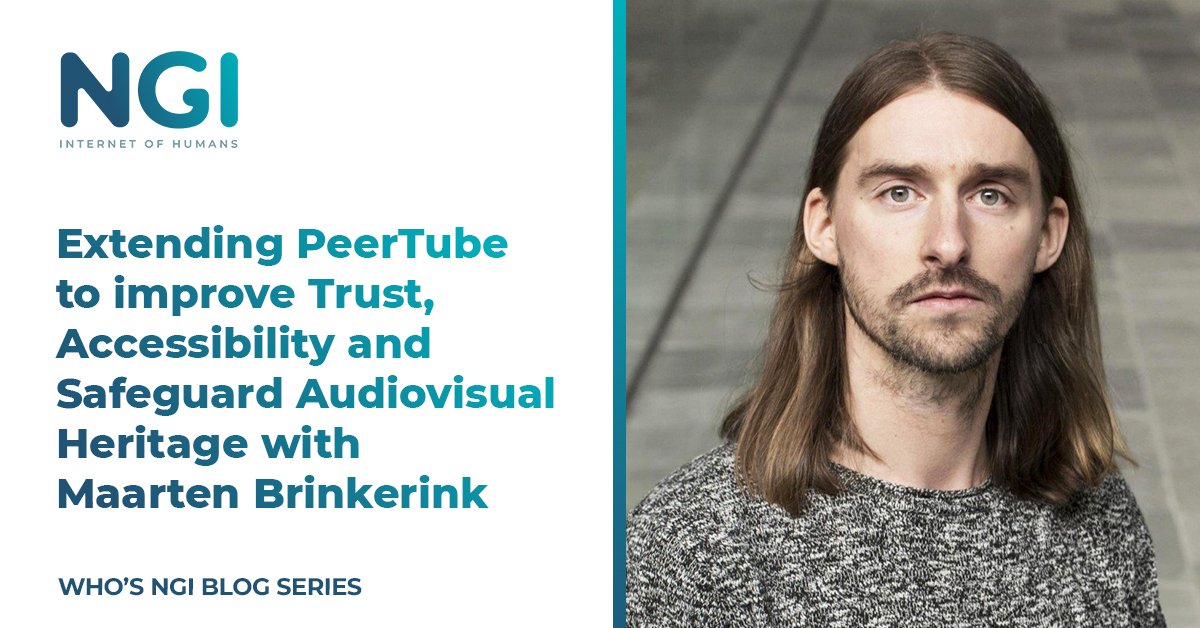 Maarten Brinkerink identified ways to strengthen the trustworthiness and scope of PeerTube, an open source free and decentralised alternative video sharing platform. Read on to learn more.
Maarten Brinkerink identified ways to strengthen the trustworthiness and scope of PeerTube, an open source free and decentralised alternative video sharing platform. Read on to learn more.
What is the project about?
At the Netherlands Institute for Sound and Vision, the national audiovisual heritage institute, we manage one of the largest digitalised media archives in the world. We share thousands of collection items as open video content, which is free and open for everyone to reuse. In the past we’ve developed a custom solution to distribute this content, according to these open principles.
Since, our custom solution has aged, while we see that sister organisations and partners in our international network have similar requirements to what we seek: Open source technology, state-of-the-art video distribution and play-out and the ability to self host.
In this project we extend the open source video platform PeerTube to fit our use case. PeerTube is an alternative to dominant online video hosting platforms, delivering the basic technology for federated public video hosting. Our project, ‘Extending PeerTube’ aims to increase the capabilities of PeerTube in terms of search technology, making it possible to search inside the content of video and improve accessibility by improving subtitling support. It will make discovery of reusable content more easy, by implementing support for open licensing metadata, that communicate the legal conditions of specific content to search engines and users.
Extending Peertube aims to extend PeerTube to support the availability, accessibility, and discoverability of large-scale public media collections, while sharing our code and insights upstream, for other users with a similar use case to also benefit from our efforts. All this to contribute to a vibrant open video sharing ecosystem.
All this fits with our long term vision to federate multiple large scale open video collections to build an international community to share and reuse our audiovisual heritage on the next generation Internet. Our project may pave the way for the massive caches of public media collections archived around the world to be made available with transparency of data.
What motivates you?
Since I started working at Sound and Vision back in 2008, I’ve been motivated to contribute to making digital heritage as likely as possible. To me this means making use of the new consumption, distribution and production potential of digital technologies and the internet.
I’ve been researching and developing new ways to openly share our audiovisual heritage. As a publicly funded institution Sound and Vision aims to share as much of its digital collection for everyone to reuse, where copyright and related rights permit us to do so. Creative Commons licenses are a crucial tool for us and other heritage institutions to communicate the conditions that apply to the open heritage resources that we share.
Popular commercial platforms don’t meet our demands, since they put public goods in a commercial business model (often partly driven by the sale of personal data and targeted advertising). In our experience the full Creative Commons licensing suite is also often not supported. Which limits Sound and Vision in the works from the collection it can actually share through these platforms.
What problem does your project solve?
Although PeerTube is technically capable of supporting the distribution of large public media collections, the platform currently lacks practical examples and extensive documentation to achieve this in a timely and cost-efficient way. Our project will function as a proof-of-concept that will showcase several compelling improvements to the PeerTube software by:
- developing and demonstrating the means needed for this end by migrating a large corpus of open video content
- implementing trustworthy open licensing metadata standards for video publication through PeerTube
- emphasizing the importance of accompanying subtitle files by recommending ways to generate them
Migration
Since the original aim of PeerTube was to provide an alternative solution to dominant video-sharing platforms, it is optimised for the single user who wants to periodically upload their user-generated content and share this as a single video within their own channel. Since our use case involves migrating multiple thousands of videos to a PeerTube instance, we worked on a toolkit and instructions to programmatically import large numbers of videos from a legacy video platform to PeerTube.
This also included instructions on implementing URL redirection in PeerTube, after migrating from a large video streaming platform.
Creative Commons
In the cultural heritage domain, the standard for free and open sharing of resources on the web has been Creative Commons licenses for over a decade now. Although PeerTube already implemented an option for their users to attribute a ‘license’ to their contributions to a PeerTube instance, this solution wasn’t (fully) compliant with Creative Commons.
As Sound and Vision values transparent and legally sound communication about the extent to which the collection items it shares on the web can be shared and reused by the public, it took upon itself the task of developing a Creative Commons compliant licensing plugin for PeerTube.
This plugin extends PeerTube with the needed user interface elements to select and display the licenses, but also inserts the correct microformats into the video item page, making the license also machine-readable.
Subtitling
The final strand of work in the project looked at improving the accessibility and discoverability of videos within large collections hosted on a PeerTube instance. It provided a guide on using the PeerTube API to – at scale – add subtitles to an instance, and also suggested ways for existing video content to be enriched with subtitles, using open source Automatic Speech Recognition software:
More information
The Extending Peertube project is executed by the Netherlands Institute for Sound and Vision in the context of the PublicSpaces initiative, supported by NGI0 Discovery.
- Project progress: https://beeldengeluid.github.io/extending-peertube/
- Tools: https://github.com/beeldengeluid/extending-peertube/
- Sound and Vision self-hosted PeerTube instance: https://peertube.beeldengeluid.nl
- PeerTube on GitHub: https://github.com/beeldengeluid/PeerTube
- The Creative Commons plugin for PeerTube: https://github.com/beeldengeluid/peertube-plugin-creative-commons
- The Creative Commons plugin on NPM: https://www.npmjs.com/package/peertube-plugin-creative-commons


